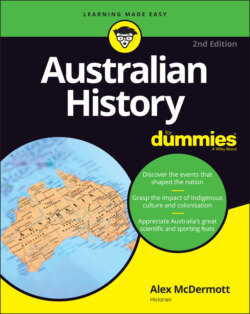Читать книгу Australian History For Dummies - Alex McDermott - Страница 76
The ascendancy of the ‘Rum Corps’
ОглавлениеAs head of the NSW Corps, Major Grose started giving land grants to officers, and to emancipists (the ex-convicts) and the few free settlers who were turning up here and there. Suddenly, the gears of the colony shifted. Not only did the new farmers start clearing and growing and reaping and rearing with new energy, but the convict labourers who were assigned to them were also launching themselves into the task with gusto.
In the first few years of settlement, the convict settlers weren’t remotely interested in being settlers or farmers. However, the NSW Corps (who, as new landholders, now had a vested interest in getting the convicts to work the land) found a way to unlock an incredible capacity for productivity. It turned out all they needed was the right incentive. The convicts were already being fed and provisioned with clothes and basic necessities. What more could they want for? The answer, of course, was alcohol. And for the more sophisticated, gambling and alcohol. The NSW Corps (which, for obvious reasons, quickly became known as the Rum Corps) provided these and the colony started to thrive.
Suddenly convicts were working incredibly hard, often putting in overtime to get tasks done. Not having had much chance to get alcohol since they’d left London, now they went after it with a zest that was almost awe-inspiring. One observer who saw it (David Collins, the future founding governor of Van Diemen’s Land) said that ‘the passion for liquor was so predominant among the people that it operated like a mania’.
Major Grose reported back to London, professing great wonderment: ‘Whether their efforts result from the novelty of the business, or the advantages they promise themselves, I cannot say, but their exertions are really astonishing’. What Grose neglected to mention, of course, was the crucial and illicit trigger for this explosion of activity.
The convicts kept coming from Britain, so the NSW Corps officers also had a great number of convicts to use. Grose and the Inspector of Public Works, John Macarthur, ensured that the officers were given about ten convicts each. The Home Office wrote to Grose, specifically instructing him that the government would pay for only two convicts per officer for a period of two years, adding that spirits not be sold to convicts (word had started getting back). But the convicts would drink, and alcohol was one of the biggest motivators that had been found to get them to work. So Grose completely ignored these instructions. And a certain degree of chaotic and riotous abandonment ensured.
With proper order and proper morality largely ignored in favour of what you could call a culture of highly productive alcoholism, the colony was no longer an economic basket case, limping along at or below subsistence level. The colony had taken off like a rocket, and was starting to make a lot of people a lot of money very quickly — but not everyone was happy with the trajectory of the rocket.
